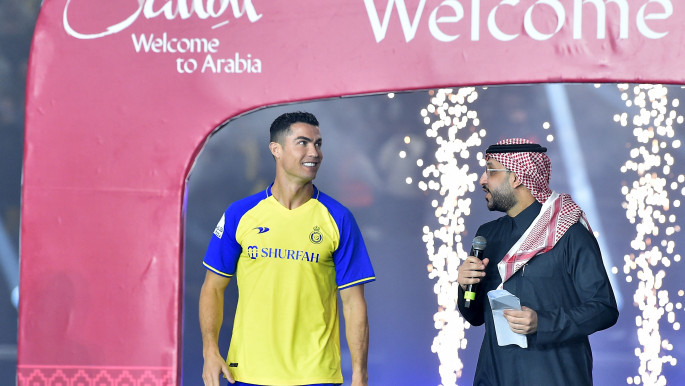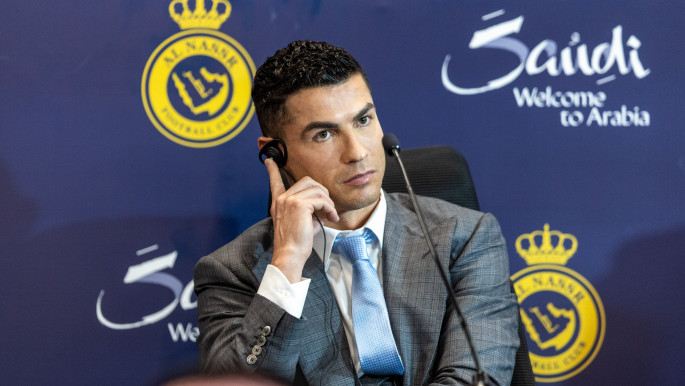

"I must say, I'm very surprised by how many people there are here today," Rudi Garcia, coach of Saudi Arabian team Al-Nassr, said before a packed press conference in the first week of 2023.
"Normally, there are only three or four journalists here to talk about the game..."
This was a media event the likes of which Saudi Arabian football had previously never seen. This was an example of the Cristiano Ronaldo effect in action.
The Cristiano Ronaldo effect
It wasn’t the first. Al-Nassr is now the most-talked-about club in Asia and beyond after announcing the signing of the 37-year-old mega-star on 30 December.
The Portuguese attacker is one of the most famous figures, not just in football, but on the planet.
His account is Instagram’s most popular with around 530 million followers, more than double the total of all 20 English Premier League clubs combined.
"Ronaldo will serve as an ambassador for both Saudi Arabian football and the country in general"
To say he brings star power is an understatement; in a world of influencers, Ronaldo is the biggest. Al-Nassr’s social media following has also grown by millions since his arrival.
Saudi media have also been talking excitedly about which countries around the world will be buying broadcasting rights to show Saudi Professional League (SPL) games.
Ronaldo’s achievements in the game have helped drive his popularity, along with a talent for branding and marketing off the field.
He has won the Ballon d’Or, the annual award handed out to the world’s best player, a record five times. The most prestigious club prize is the UEFA Champions League, and he has won that five times too, with Real Madrid and Manchester United. He has also won league titles in Spain, England, and Italy.
On the international stage with Portugal, where he helped win the 2016 European Championship, he has scored more goals than any other player in history.
Along with Lionel Messi of Argentina, he has been the best, most consistent, and biggest name player this century and, some would argue, the best ever.
This is what Al-Nassr, who are reportedly paying $200 million a year though there is no transfer fee after Ronaldo’s contract with Manchester United was terminated by the club in December after a falling out, are buying.
"The agreement is not limited to football... it is commercially beneficial for us in terms of profitability," said Al-Nassr president Musalli Al-Muammar.
“Ronaldo will help achieve more success for the club, Saudi sports, and future generations".
|
|
Al-Nassr already strong
In terms of success for the club on the pitch, the Ronaldo effect may not be huge. Around the halfway stage of the current SPL season, Al-Nassr are already going well and the day after his move was made official, the nine-time champions moved top with a 1-0 win at Al-Khaleej.
While the Riyadh club does not have a trophy cabinet the size of city rivals Al-Hilal, the most successful club in the country and in Asia with 17 domestic and four continental titles respectively, they are one of the biggest clubs in the country and the region.
Even before the arrival of Ronaldo, there were stars such as Vincent Aboubaker, the Cameroon striker who scored the winning goal against Brazil at the recent World Cup, 2018 South American Player of the Year Pity Martinez, former Arsenal and Napoli goalkeeper David Ospina, and Brazil’s Anderson Talisca, as well as six members of Saudi Arabia's World Cup squad.
Former Lyon, Marseille, and Roma coach Rudy Garcia is in charge. It is one of the strongest squads in Asia. Ronaldo’s goals - he scored 18 in the English Premier League last season - may help deliver the title, but as Al-Musalli mentioned, there are bigger prizes at stake.
"His signing is also a brand positioning statement as well: that the league and the country see themselves as being amongst the best in the world – high value, lots of status, ambitious and aspirational"
Boosting the league and more
“The Saudi Arabian League is very competitive. I know people don't know that,” Ronaldo said in Riyadh on 3 January. The hope is that because of him, people will know very soon.
The SPL has improved in recent years with the arrival of top-class foreign stars. Al-Hilal have become the best team in Asia with Al-Ittihad and Al-Shabab also powerful.
The stock of Saudi Arabia’s domestic talent is also quite high following the national team’s historic win over Argentina at the World Cup, a team made up entirely of home-based players.
The league is, along with Japan, the best in Asia but is not much followed elsewhere in the continent, never mind the rest of the world.
“Ronaldo will serve as an ambassador for both Saudi Arabian football and the country in general,” Simon Chadwick, Professor of Sport and Geopolitical Economy at Skema Business School, told The New Arab.
“But his signing is also a brand positioning statement as well: that the league and the country see themselves as being amongst the best in the world – high value, lots of status, ambitious and aspirational.”
|
|
Inspiration
As Al-Musalli said, there are hopes that Ronaldo will not only inspire a new generation of Saudi fans to look more towards the domestic league than the big European competitions but also to play the game.
It was also noticeable in his first press conference how the player talked about helping women’s football in the country. In 2022, the women’s national team played their first ever international games, there is a women’s league, and also a bid to host the 2026 Women’s Asian Cup.
An early sign as to how sport’s biggest influencer can make a difference is whether other global stars follow in his footsteps. There have been rumours of Croatian legend Luka Modric leaving Real Madrid and French midfielder N’Golo Kante departing Chelsea to join Ronaldo at Al-Nassr.
"Other stars following him would generate awareness of and interest in the league, its clubs, and the country"
“The meaning of Ronaldo’s signing for the league is probably best assessed in terms of who the next big star signs for a Saudi Arabian club,” said Chadwick.
“The next signing will therefore be hugely symbolic. Other stars following him would generate awareness of and interest in the league, its clubs, and the country.”
The arrival of Ronaldo is an incentive for Al-Nassr and other clubs, to raise their games off the pitch. Making the most of Ronaldo’s popularity long-term needs a clear objective and strategy. Football clubs in the region are not known for long-term thinking and Saudi Arabia is no exception.
“Ronaldo alone will not revolutionise Saudi Arabian football, though he is intended to serve as an enabler of change,” added Chadwick.
Big names have gone to Asia in the past, a whole host went to China in the previous decade and had little effect apart from draining the resources of clubs, and Qatar and the United Arab Emirates have at times spent big on ageing stars.
None though have had the profile of Cristiano Ronaldo. The short-term effect has been massive but bringing about meaningful medium and even long-term improvements is going to be a challenge even for one of the best players in history.
It is going to be a fascinating journey and one watched by the world, for good or for bad.
John Duerden has covered Asian sport for over 20 years for The Guardian, Associated Press, ESPN, BBC, New York Times, as well as various Asian media. He is also the author of four books.
Follow him on Twitter: @johnnyduerden





 Follow the Middle East's top stories in English at The New Arab on Google News
Follow the Middle East's top stories in English at The New Arab on Google News


